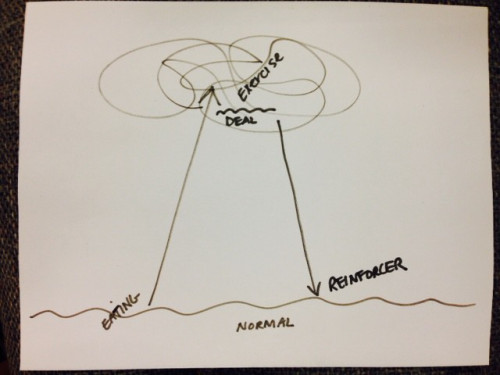February 25, 2016
By Lindsay Wallace
*TRIGGER WARNING*
Several years ago, I reached a dangerously low weight – roughly 15 pounds below the recommended weight for someone of my height. I should have been concerned, yet I failed to realize the seriousness of my situation.
I was obsessively counting calories, restricting my diet, and over exercising. I measured my self-worth by how flat my stomach was, the amount of fat you could pinch underneath my arms, the size of my pants, and the number on the scale.
My appearance was the only thing that mattered and the only way for me to control that was through food and exercise. As a result, food was triggering immense feelings of anxiety. They were the first things I thought about when I woke up in the morning and the last thing on my mind before I went to sleep.
During the day, I would count down the hours and minutes until the next “snack” because I couldn’t eat a minute sooner. Every night, I planned out my meals for the following day, recorded the calories, and determined how much I needed to exercise to stay at just 800 calories a day. Under no circumstances could I deviate from that plan.
Oftentimes, I would cancel plans with friends to spend more time in the gym. I made excuses not to eat out – something I loved to do – because navigating a dinner menu gave me high anxiety. I found that every time I ate, I only thought of the calories I was putting into my mouth. I stopped savoring the food. And I have always loved food.
Eventually, I sought help from a therapist following a moment of self-awareness where I acknowledged that maybe I wasn’t doing very well. It was when, after a three-hour workout, I refused to eat because I had two cookies earlier in the day (it didn’t matter I had just burned 800 calories). My body was starving and screaming at me I NEED FOOD, I NEED FOOD yet I ignored those cries for nourishment and took a sleeping pill, hoping to sleep off the hunger.
I woke up the next morning knowing my behavior and thought process was irrational. I asked myself why in the world I was doing this to my body and why couldn’t I just stop?
When I relayed this to my therapist, she drew me this:

Food was my trigger. When I had to eat, my anxiety skyrocketed. The eating disorder yelled at me and said things like, “What are you doing!? You’re going to get fat if you eat that!” or, “That’s disgusting! Stop eating!” So, I would make a deal with the eating disorder. If I eat this cookie, I will do XX amount of additional exercise. Or, if I eat this burger I won’t eat dinner. The eating disorder would say OK and my anxiety would plummet. Thus, “the deal” became a powerful reinforcer for the eating disorder to continue. It was the coping mechanism for my anxiety.
This realization impacted me in a fundamental way: I finally accepted I was on the verge of a full-blown eating disorder and could land in the hospital.
I am ashamed to admit, though, that when my therapist relayed this information back to me, I was actually excited. I feel awful about feeling this way because eating disorders are certainly not something one should aspire to. Yet, in some odd way, it validated my feelings of success at losing weight and having the perfect body. I won the competition against myself.
I did want to change my behavior, though. So my therapist and I made a plan and I started to make progress, gaining back some of the weight I had lost. But then I relapsed as the thought of gaining too much weight back caused extreme anxiety. This time, we made another plan that was more gradual and easier for me to grasp on to. I tried hard and I’m still trying hard. I’m proud to say that since that time, I’ve been in recovery.
I feel good about reaching recovery, but I also acknowledge that recovery isn’t final. As many steps as we take forward, there’s always a chance we can revert back into our old habits. My thoughts and behaviors haven’t fully changed. I still stand in front of the mirror and measure the gap between my thighs, the fat underneath my arms and how flat my stomach is. I’m still a walking calorie counter.
However, I accept these thoughts and behaviors are part of who I am. While not ideal, I think the more important thing to note is that I am doing better. I know I am not alone in my journey, which inspires me to keep trying every day.
Submit To The NAMI Blog
We’re always accepting submissions to the NAMI Blog! We feature the latest research, stories of recovery, ways to end stigma and strategies for living well with mental illness. Most importantly: We feature your voices.
LEARN MORE